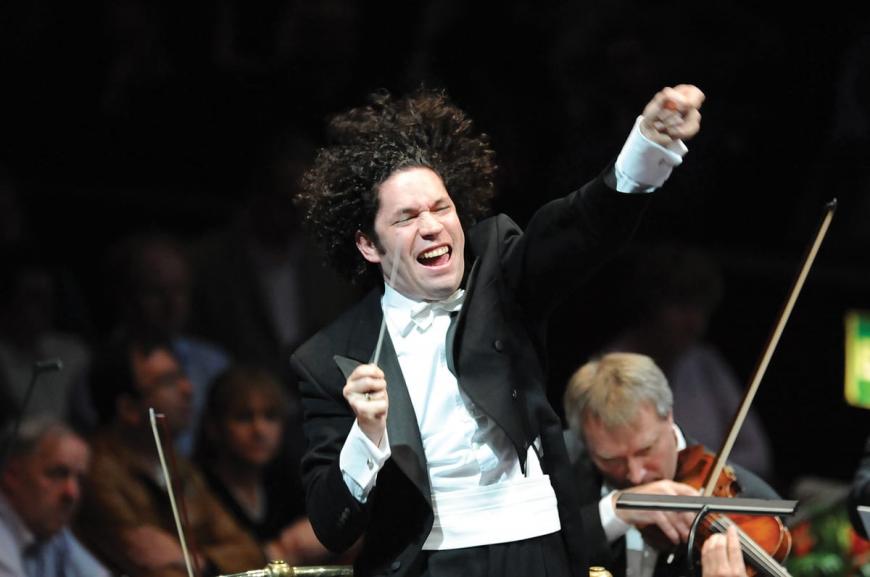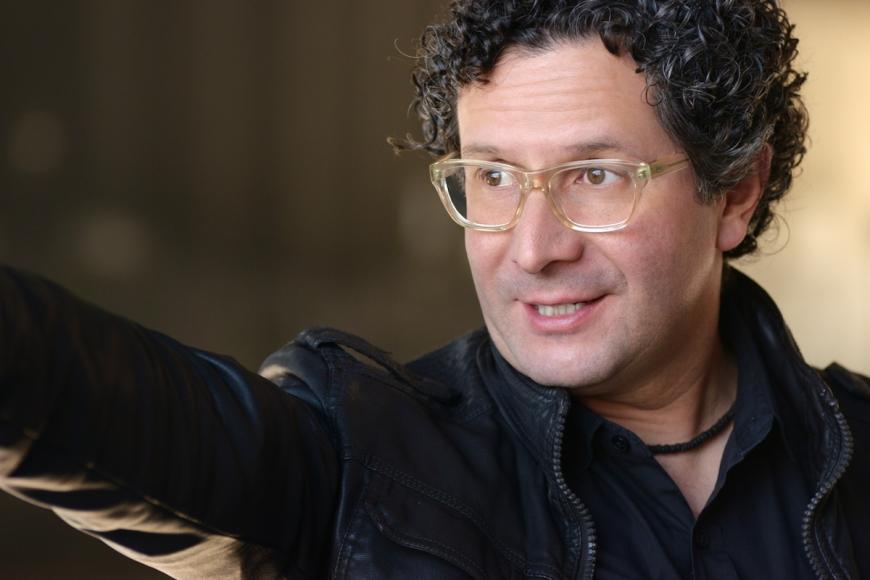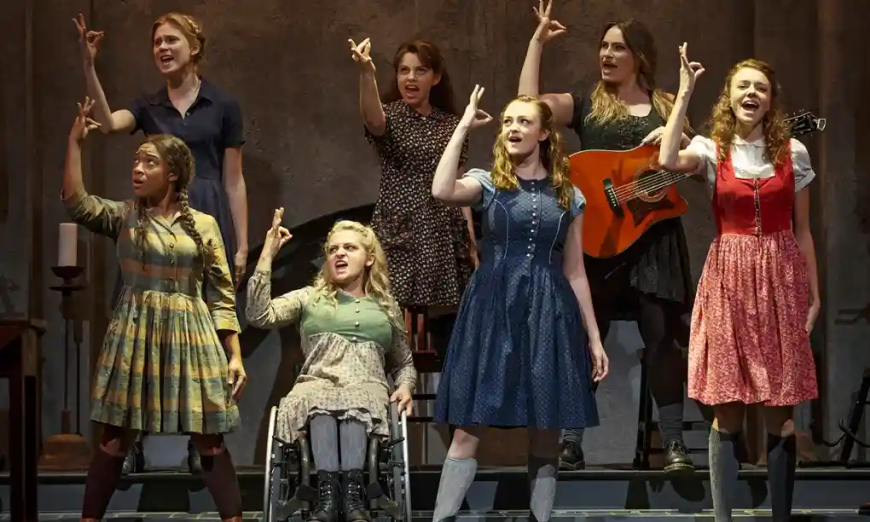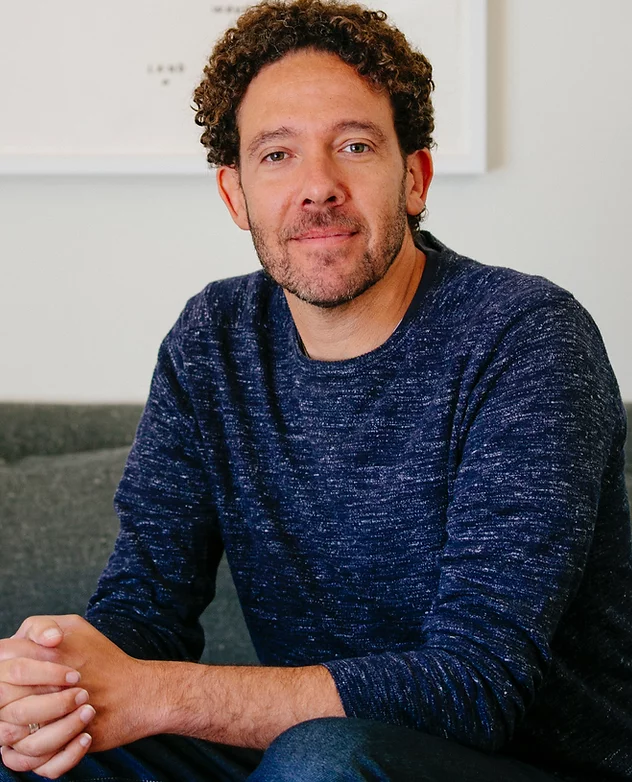
If epic love, wordless emotion, and timeless, visual grandeur can be communicated entirely in silence and solely through physical gesture, facial expression, or imagery — think of a maternal caress, the look of passion in a loved one’s eyes, and late afternoon sunlight transforming grassy hillsides into plush carpets of green or gold — then why not an opera conveyed without sound?
Bringing that revolutionary idea to life is the goal and possibly the revelation that audiences will find in an upcoming production of Beethoven’s only opera, Fidelio. The Los Angeles Philharmonic, the orchestra’s music and artistic director Gustavo Dudamel, and members of Deaf West Theatre are engaged in a unique partnership leading to an innovative semi-staged performance at Disney Hall April 14–17.
The production arrives on the wings of notable talent: It is directed by cinematographer Alberto Arvelo, co-directed by Joaquín Solano, and produced in collaboration with Los Angeles’ Tony Award-winning Deaf West Theatre led by Artistic Director David Kurs, (a theater company recently recognized for their pivotal role in the Grammy Award-winning film CODA). Joining them are El Sistema’s Coro de Manos Blancas (White Hands Choir with Artistic Director María Inmaculada Velásquez).
A remarkable cast composed of singers and actors rockets the production into galaxies rarely explored as hearing and non-hearing artists fuse purpose and craft to deliver the libretto. The opera includes sections spoken, not sung, and a narrative that places particular emphasis on visual symbolism and human gestures, and requires astute staging and nuanced vocal and acting skills.
Fidelio premiered in 1805, during a time when Beethoven was grappling with his increasing deafness. The opera’s long, torrid history is textured with intriguing gaps and disagreeable interactions, but the libretto’s timeless themes of redemption, love, and hope — let alone Beethoven’s remarkable score — soar above the work’s friction-filled past.
Fidelio tells the story of Leonore, who disguises herself as the male prison worker Fidelio to rescue her husband Florestan, who has been unjustly incarcerated. Leonore’s acts of bravery to liberate her husband, the LA Phil’s website suggests, parallel the desire Beethoven himself might have had — to break the bonds of his increasing loss of hearing and frustrations he experienced while practicing his art.

In an interview, Arvelo says rehearsals and the collaboration between LA Phil and Deaf West Theatre have completely transformed his sense of hearing.
It’s been a revelation. The creative effort, recreating music using just visual movements and elements has been a strong and powerful experience. The idea of what we’re doing as singers, that the actors and someone in the audience cannot hear it … To try in the best possible way to explain to a nonhearing audience that we are changing to minor tones; it taught me about the power of the human soul. I’m hearing everything in a different way.
I had a walk yesterday and I was hearing birds. In a way, it’s usual, normal, it’s always there, it’s the way the world is. But after this process, I’m hearing from a different point of view. I’ve tried to imagine the world as my friends of Deaf West [experience it]. I’ve tried to understand the beauty of things we cannot hear. It’s a contradiction and also is so rich. It’s a learning process we all should have. This project will help the hearing audience to integrate better with non-hearing audiences, artists, and actors. It’s integration in a very deep way. Those birds, what changed was the consciousness of what I was hearing. It’s hearing the silence and knowing when you don’t hear anything. It’s given me an ear for silence.”
His ideas about the opera, traditionally perceived as a story centered on pure love, hope, and eternal bonds — topics he emphasizes remain essential during contemporary times — have also radically expanded during the creative process. “That is what is most surprising to me. Fidelio is about love and Leonore’s path but [equally] it is the story of freedom,” Arvelo said. “We created video art the audience will access with PR codes before the performance starts that are reflections we all need to consider. What transmits is timeless. Every era has the same problem: its own fight for liberty and questions we must ask ourselves. What is our fight? What are we fighting for? It’s the same struggle as is in Fidelio, even after 200 years,” he said.
Asked for specific examples of methods the cast and directors have discovered within the production to make musical elements visual, Arvelo says vocal crescendos can be addressed by having more and more singers join a soloist to create “visual volume.” He refers to the music as poetry accessed in nontraditional, cinematic, powerful ways. The overture that is all orchestral relies on specially choreographed lighting to deliver the score’s unusual emotional expression.
“The overture is optimistic compared with the darkness of the rest of Fidelio. We created everything so we don’t have a Deaf audience waiting for any musical moment. We recreate the emotions of the music by having the choreography of the actors and singers bringing in candles from all the entrances of Disney Hall. We made a sort of dance of light. It’s like fireflies clinging to the singer who brings a lantern to the stage. It evokes the same hopefulness onstage as what is played by the organ in the hall. It recreates the energy and beauty of the overture with light.”
Arvelo says that observing the connections made between the singers and the actors — “I prefer to call them actors, not Deaf actors, because they are simply incredible actors,”— is elevating. “It touches our souls. It’s very emotional. We are trying to do art, something as complex as opera. I’ts a fascinating journey and a collective learning experience.”

Deaf West’s Kurs, responding to a similar question about how the collaborative experience is affecting him, writes in an email, “I am Deaf and come from the Deaf community. I’ve had the privilege of being an audience member during rehearsal. Seeing the Deaf performers at work in the rehearsal room gives me the chills. I know it feels like I’m spouting cliches but as the Deaf performers express the songs there is a certain kind of visual harmony that is truly thrilling.”
To Kurs, the opera’s themes and Beethoven’s condition at the time he composed the music hold obvious resonance for the Deaf community and offer contemporary relevance for hearing and nonbearing audiences. “The themes of hope, struggle, and longing are extremely potent vehicles in terms of expression for signed music. Sign language brings honesty and emotion to the surface. We are natural communicators and these themes become magnified when expressed through the hands, body, and, most of all, the eyes. The art form of opera might be foreign to our community but there is the commonality that the house becomes dark, and we become storytellers to a rapt audience. I sense that for the uninitiated Deaf audience member, it will be like stepping into a foreign country with all of its attendant customs and quirks, but we will be the better for having had that experience.”

In the rehearsal room, Kurs says the singers have to learn how to work with the Deaf actors and the Deaf actors have to learn a new art form. “The process requires that everyone becomes vulnerable, and in that vulnerability a certain sort of truth emerges. My hat goes off to the creatives, cast, and the staff for their abiding and unceasing, mutual respect for the process. It’s not always a seamless journey but the results are nearly always worth it.”
Asked what benefits Deaf West brings to the artists of the LA Phil through this project, he replies, candidly, “If I may be so humble, I think that all opera should be signed from this point on! Deaf West Theatre has centered Deaf artists and we are very clear that in our collaborations, we need to center the Deaf audience experience. We’re simultaneously excited and terrified but I’ve had the privilege of being an audience member in the rehearsal room and it’s amazing to see what our cast brings each time. Through their expressivity and through the communication in their eyes, our cast brings new meanings to the songs and to their characters.”
Kurs says the company is constantly thinking about ways to bring opera to Deaf audiences. He values “leaps in the craft and artistry” of the actors that will come from working closely with the singers as the music evolves and their characters grow richer, more complex. “As a community, we’re very proud of who we are. At the same time, we all experience music in different ways. You said [Deaf or hard-of-hearing people) are not a monolith. I think that there are varying degrees that we take in sound, and we want to honor each section of the spectrum with this experience. We have a Deaf cast, but they all work with the music in their own ways, and it’s been fascinating to see the nuances and distinctions in that process.”
Invited to think forward to the next collaboration he envisions for LA Phil and Deaf West — perhaps even a film of Fidelio — Arvelo says, “I love this good question! We are adding cinematic elements: projecting actors on screens that are the size of the organ at Disney Hall, just to make them more accessible. Like a film, it is human language expressed through art and beauty. It is human language through emotions and effort. We’re trying, from different places, to achieve this understanding of love. This trying is in itself love, and yes, it could make a film.”
He said that if fortune favors him, he’d find directing a production of Mozart’s The Magic Flute with Deaf West fascinating. Kurs has a futuristic dream that leaves a wide-open doorway. “Beethoven is our brother, so he’s our first choice. But he only wrote one opera. Are there any other Deaf composers out there?”

